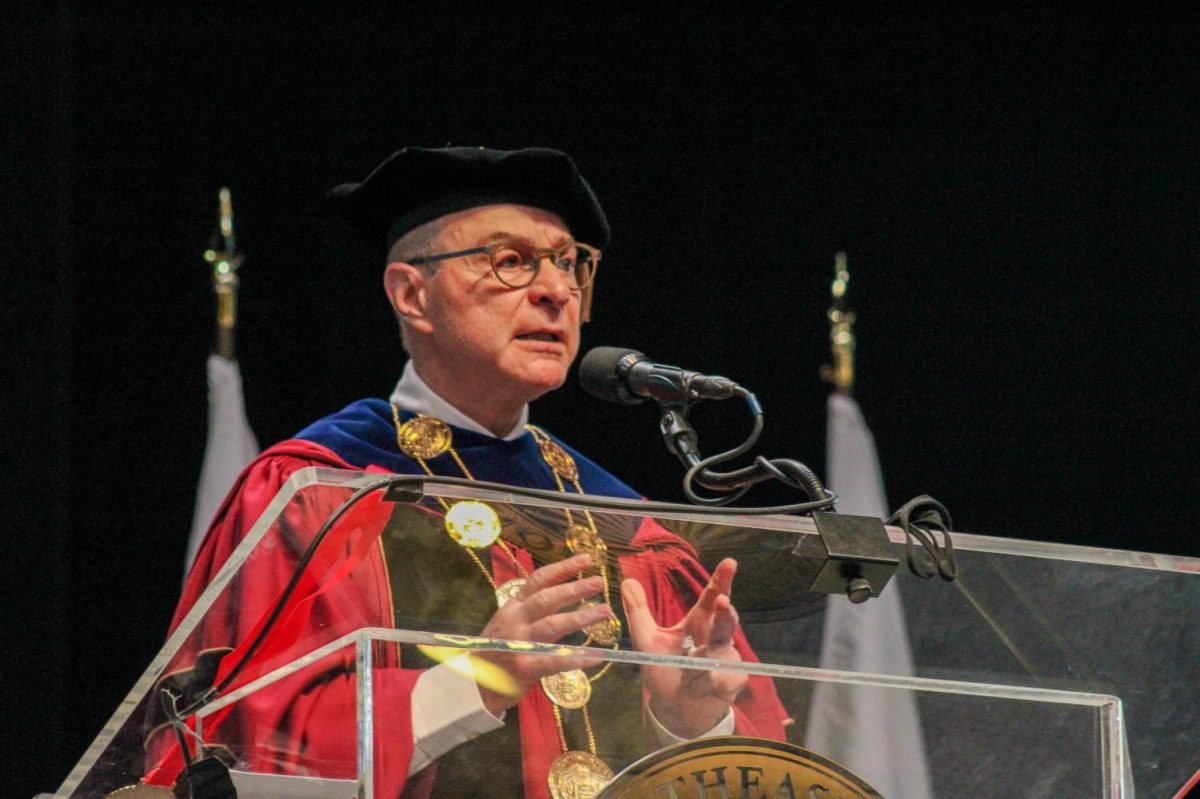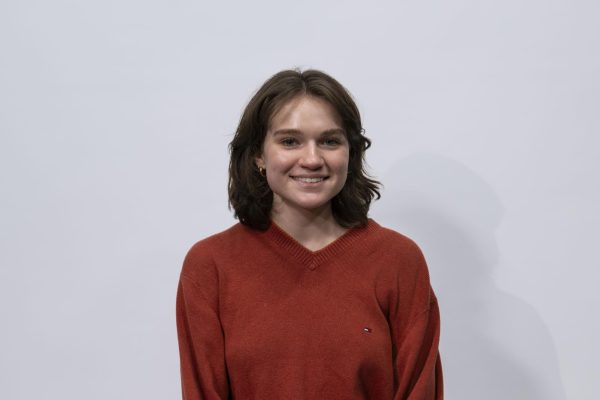It’s been one year since Northeastern President Joseph E. Aoun made a statement about the Israel-Hamas war, an international conflict that has roiled the campus community and colleges around the country.
Aoun, in a letter cosigned by Provost and Senior Vice President for Academic Affairs David Madigan and Chancellor and Senior Vice President for Learning Ken Henderson, last made a statement about the conflict Oct. 10, 2023, three days after Hamas carried out widespread attacks on Israel. The letter condemned the “terror and bloodshed” that resulted from Hamas’ attack, in which the Palestinian militant group killed some 1,200 people and took more than 150 others hostage.
“As war now ravages Gaza and Israel, we mourn for all the innocent lives that have been lost,” the letter read. “To the many members of our community directly affected by these horrific events, you have our utmost solidarity and support.”
In the year following the statement, students condemned the university leadership’s lack of additional statements about the war. Israel’s military campaign in Gaza, which, according to multiple human rights research centers, has violated the United Nations’ Genocide Convention, has killed more than 41,000 Palestinians over the past year.
Since Oct. 7, 2023, pro-Palestine students on the university’s Boston campus have held numerous demonstrations criticizing Northeastern’s partnership with companies that supply weapons for Israel’s counter-offensive on Gaza and nearby territories. Just days after Aoun released the statement about the war, more than 1,100 people signed a petition urging the university to revise its statement.
That petition now has 1,932 signatures.
“Northeastern University’s recent actions and statements have favored one side, specifically Zionism, which has caused our students of Palestinian descent and Muslim students to feel isolated, unheard, and unsafe,” the petition, addressed to Northeastern’s “leadership team” read. “We urge you to reconsider your position and take a more balanced and compassionate approach to the situation, acknowledging the tragic loss felt on both sides.”
Aoun’s letter said the university “welcome[s] peaceful dialogue and debate” but that the community “should all be united in … condemnation of terrorism and the killing of innocent civilians.”
The university has made statements about student demonstrations against the war, most notably Northeastern’s April encampment, often through a frequently asked questions article published by the university-run media outlet Northeastern Global News in December. But Aoun and other university leaders have remained relatively quiet on the conflict itself and have often avoided in-person confrontations with demonstrators.
At other nearby institutions, most notably Harvard University, statements about the war from administrators have prompted backlash from students and other community members.
Harvard’s series of public statements about the conflict — eight after its initial statement, which Harvard’s provost told The Crimson he “regrets” — caused international backlash from Harvard affiliates with both pro-Israel and pro-Palestine views on the conflict, culminating in President Claudine Gay’s resignation in January. Several other university presidents also faced backlash over their statements, including Emerson President Jay Bernhardt, who the Student Government Association voted it has “no confidence” in after the university’s handling of a pro-Palestine encampment.
But Northeastern’s top administrators, including Aoun, have faced limited public scrutiny. Outside of the April encampment, Northeastern remained out of national headlines and continued to see an increase in popularity with applicants.
In May, Harvard adopted a new policy on its institutional voice, announcing it would no longer make statements about issues that don’t directly affect the university’s “core function.”
Several other universities across the country including Cornell University, the University of Pennsylvania and the University of North Carolina campus system followed Harvard’s lead in adopting institutional neutrality policies.
But at other nearby schools, like Boston University and the University of Massachusetts Amherst, presidents have recently issued statements about divisions on campus and what administrators are doing to ease tensions.
Northeastern hasn’t officially adopted institutional neutrality policies through its governing documents. But in an April interview with The News, Senior Vice President for External Affairs Mike Armini, who Aoun appointed the “point person” for communication on the conflict, said the university will limit statements from the administration about the war.
In the April 12 interview, conducted two weeks before pro-Palestine students erected an encampment on Centennial Common, Armini said the university has and will continue to limit “digital” communication and focus on meeting with various stakeholders to hear about their views on the conflict.
“We’ve spent an enormous amount of time and effort meeting with people, sitting down with people, preferably in person, hearing what everyone has to say, breaking bread,” Armini said. “There’s something that is lost when you’re doing things digitally. Some of these meetings have been difficult, but at the end of the meeting, it’s almost always true that people feel heard.”
Armini added he thinks email is an “incredibly overrated medium” that the university will stay away from.
“For some reason, there’s this tendency, particularly in higher education, to try to solve problems with top-down emails,” he said. “I don’t think it works, and so the opposite of that is human engagement. So we’ve made a real distinction between the words ‘communication’ and ‘engagement.’”
He added, before the April encampment, that there has been pressure on the university to make statements at certain points throughout the conflict.
“I would say there have probably been eight or nine instances in the last six months when there was a lot of pressure on us to send out another email, including during Holocaust [Awareness] Week,” Armini said. “I understand where that comes from, but we’re sticking to a strategy that I think has served the university well.”
Armini said that the university’s decision to focus on individual meetings as opposed to mass communication also allows faculty to engage with students.
“We’re an educational institution and not everything should be taken care of by the president or the provost or the chancellor,” he said. “It’s actually an opportunity for the faculty who have real expertise to step up and have their voices be heard.”
Staff Writer Eli Curwin contributed reporting.
The Huntington News is dedicated to serving the Northeastern University community with original, professional reporting and creating an environment in which student journalists can learn from one another. Support an independent, free press at Northeastern University with your donation today.











